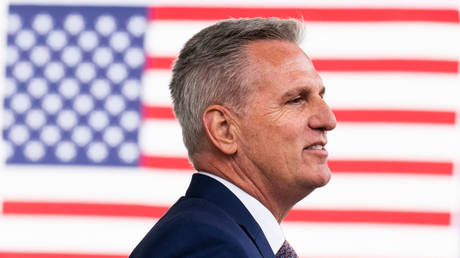China needs to do the right thing if McCarthy goes to Taiwan
If the new US House speaker follows Nancy Pelosi’s example, Beijing must carefully measure its reaction

China needs to do the right thing if McCarthy goes to Taiwan
By Timur Fomenko, political analyst

Newly appointed Republican speaker of the US House of Representatives Kevin McCarthy is reportedly preparing for a visit to Taiwan. The news should not surprise anybody.
Beholden to his party’s right wing, which blocked his election 15 times, and a scathing opponent of China, it is to be expected that McCarthy is both out to make life as difficult as possible for the Biden administration and to derail any stability in Washington’s relations with Beijing, pushing for further hawkishness where possible.
In anticipation of this visit, the Pentagon is making contingency plans already. When Nancy Pelosi controversially visited Taiwan in August, it generated a crisis as China responded with fierce military exercises, raising alarm about a potential war brewing between the US and China over the island’s fate. Of course, there is nothing the Republican Party in particular would like to do more than to steer US-China ties towards conflict in the bid to introduce even more hard-line policies against Beijing and to intensify an already emerging cold war.
China’s position on Taiwan has always been clear. Beijing considers the island part of its territory and perceives the US as deliberately stoking up sentiment of “Taiwan independence” to undermine China as a whole. But this time around, Beijing should not take the bait. McCarthy’s immediate and public declaration of intent to visit Taiwan is designed to be deliberately provocative, and is a slap in the face to China, but an escalatory reaction to this would cause more trouble than it’s worth for Beijing.
First of all, it should be taken into consideration that Kevin McCarthy is an opposition politician, and is working against the presidential administration, unlike Nancy Pelosi, who represented the same party. Part of Beijing’s anger against her trip was caused by the fact that the Biden administration did nothing to stop her, aside from publicly warning against the move. McCarthy, in contrast, is part of the Republican Party and the White House does not have influence over where he chooses to go. He is an opposition politician who acts antagonistically to his country’s executive branch of government, even if containing China is something both US parties agree on in principle. As such, the political stakes for his visit are lower and there’s less blame that China would be able to pin on the Biden administration if it goes ahead.
Despite the fact that China places strong emphasis on its own territorial integrity, a strong reaction from Beijing over McCarthy’s visit would work against its long-term interests. It has been made clear by US politicians multiple times that they are ideally seeking to replicate the “Ukraine model” in East Asia. This means provoking a rival state into a conflict which allows Washington to exert military influence in the region, break up regional economic integration, and rope in allies.
The US is actively using the Taiwan issue to foment instability in Asia. For example, it is forcing the Philippines to take a positionon a potential Taiwan conflict. In doing so, it seeks to thwart Manilla’s increasingly “non-aligned” attitude towards China and break growing economic ties between the two. The more insecurity and instability the US can create around Taiwan, the more leverage it will attain over others. The US does not want Asian countries to pool their economies with China, it wants to create a NATO-like system of containment whereby its hegemony is forced on them through dependency.
Therefore, if Beijing reacts forcefully, even to assert its position, it gives momentum to other anti-China causes. It is no coincidence that, after the Taiwan crisis in August 2022, scores of new anti-China sanctions were pushed through by both the White House and Congress. Likewise, the misleading comparison between Taiwan and Ukraine will be used to garner greater sympathy, support and attention for Taipei in other Western countries. It is a lose-lose scenario for China to overreact, especially if, thanks to Western media scaremongering, Beijing is all but expected to pursue war – anything less than that will then depict China as spineless (as happened following Pelosi’s visit).
Given this, it would be best for China to make a stronger diplomatic, as opposed to military, protest towards a visit by Kevin McCarthy. Don’t let the hawks win by giving in to their bait. Beijing should, as it did with Pelosi eventually, simply respond by blacklisting McCarthy in the country and blocking any potential interests he could have in China, and likewise by cutting off US-China dialogue and putting the US presidential administration in an awkward situation whereby it has to reiterate its “support” for the One China policy, which remains de jure, even if not de facto, Washington’s official position. Above all, another Taiwan Strait military crisis would be a huge overreaction, and the US and the mainstream media have the ability to manipulate the discourse of such an event in a way that puts China at a disadvantage. Beijing is likely aware of what Washington’s game with Taiwan is, but to succeed also requires restraint as much as it does deterrence by force.
The statements, views and opinions expressed in this column are solely those of the author and do not necessarily represent those of RT.












